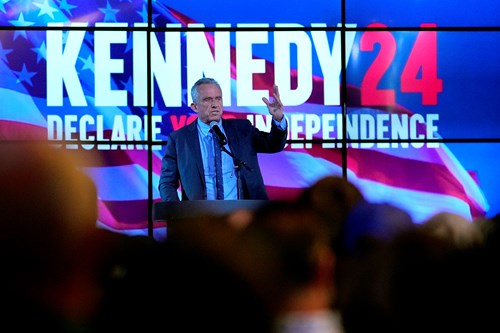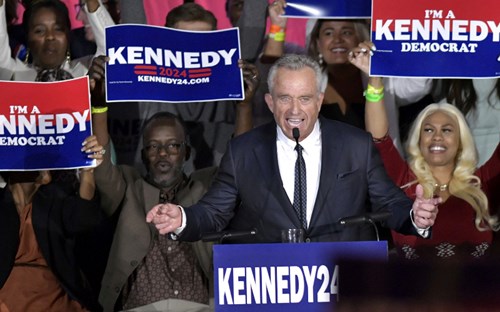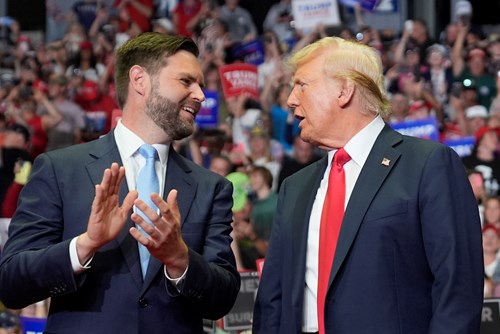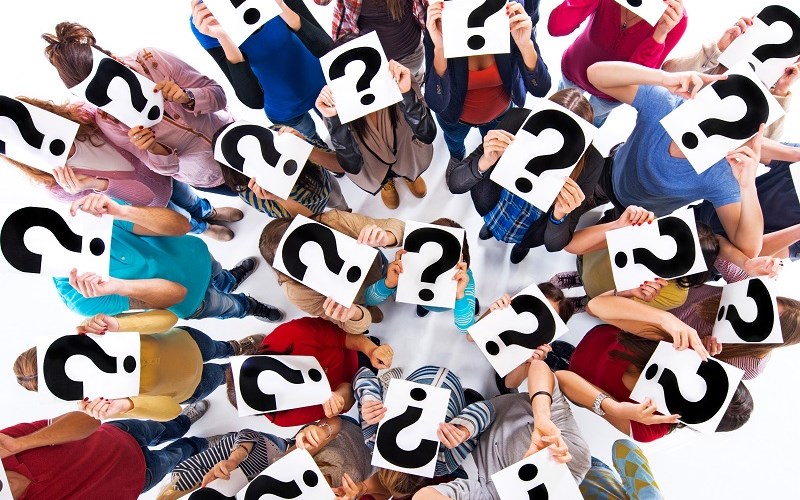He is expected to announce his decision in Arizona, and the timing and location are significant.
Republican nominee Donald Trump is holding a rally in Phoenix on Friday, and Kennedy, from one of the Democrats’ most historical families, will likely endorse Trump for president.
Kennedy’s support reached as high as 12% in some polls earlier this year but those numbers have declined.
The latest average of national polls at 538.com, a project of ABC News, shows Kennedy getting 4.8% of the vote.
 All of those voters would push Trump past Kamala Harris, who currently has a 47% to 43.7% edge in the current averages at 538.com.
All of those voters would push Trump past Kamala Harris, who currently has a 47% to 43.7% edge in the current averages at 538.com.
Getting all the Kennedy supporters is unlikely, GOP strategist John Cardillo said on American Family Radio Thursday.
For starters, Cardillo doesn’t think Kennedy, who has polled consistently at 4% or less for several weeks, will move the needle much one way or the other, he told show host Jenna Ellis.
But the motives of Kennedy voters are significant.
“They were always protest votes. I mean, sure, there was a coalition of people who were single-issue voters because of his positions on the vaccine on medical freedom, things of that nature,” Cardillo said.
There is Kennedy buzz...but not much
Some Kennedy positions created a buzz, Cardillo said, but not enough buzz.
“At the end of the day, despite him being good on one or two issues, and I think the second issue I would say he's good on, is wanting to dismantle most of the bureaucracy in D. C., getting rid of agencies, but I think by and large, these were protest votes.”
They were equal opportunity protest votes, spreading the hate between Biden and Trump then Harris and Trump because of “vaccine mandates, COVID tyranny, etc,” Cardillo said.
Now he sees one protest vote leading to another.
“My fear," he shared, "is people are just going to either cast another protest vote for some third-party candidate who can’t win or sit out.”
Christian Briggs, an economist and political analyst, is the CEO of Hard Asset Management, Inc. He believes an RFK Jr. endorsement of Trump is imminent.
 "He definitely wants to join Trump. It's just a matter of the politics and the understanding,” Briggs tells AFN. “I think he's probably talking to [Trump] right now, negotiating something to endorse him and then to be able to be put into a Cabinet position, which he would be very good at because he agrees with every single policy as far as the fiscal side. [And] I think that they've come to some agreement on some of the social parts."
"He definitely wants to join Trump. It's just a matter of the politics and the understanding,” Briggs tells AFN. “I think he's probably talking to [Trump] right now, negotiating something to endorse him and then to be able to be put into a Cabinet position, which he would be very good at because he agrees with every single policy as far as the fiscal side. [And] I think that they've come to some agreement on some of the social parts."
The issue for RFK, according to Briggs, is communism in the Democratic Party.
"JFK, RFK, the entire Kennedy family – none of them signed up for communism,” he argues. “In fact, JFK was anti-communist back in the 60s before he was assassinated."
Briggs thinks RFK’s endorsement will make a difference – “a solid one to two points, possibly as much as three" – in Trump’s favor.
Some of those Trump protest votes may not choose to sit out but turn into actual Harris votes, Cardillo said.
Cardillo said he was shocked to learn from an AFN report that almost half of Evangelicals aren’t registered to vote.
“I knew that voter registration in that community was tough a few years back, but hearing that gives me pause,” he said.
Now the bad news for Trump
The bad news for Trump right now is how he’s polling. His campaign would be unwise to flippantly write off the numbers from 538 or whatever their choice of polling might be.
Technological advancements have changed the game of election guessing.
“I don’t inherently trust them because I think polling methodology by and large is an old science, but when you combine it with newer sciences, the use of AI (artificial intelligence) with regard to sentiment analysis, we know that likeability really matters.
“So, when you compare these polls, especially from the firms that were accurate in the primary against pretty sophisticated sentiment analysis tools, now you don’t have an 839-registered voter sample. Now you can look at millions of conversations, and it becomes hyper accurate,” Cardillo said.
Increased accuracy of polling cuts both ways. Trump has a likeability problem, but Harris has a competency problem, Cardillo said.
Trump, however, can manipulate his polling to a degree.
 “There are four to seven percent and even lower these days -- around two to three percent in the middle -- that you need to win. They’re going to vote on sentiment. Who do they like the best? Who do they think is competent? Who do they think could do the job better?
“There are four to seven percent and even lower these days -- around two to three percent in the middle -- that you need to win. They’re going to vote on sentiment. Who do they like the best? Who do they think is competent? Who do they think could do the job better?
“I think we’ve got a likeability problem with Trump – except when he’s on message. I just hope he stays on message and dispenses with the personal attacks of who Kamala had affairs with in the ’90s,” Cardillo said.
Ultimately, the best value from a Kennedy endorsement will be if voters consider the historical significance of his lineage, Cardillo said.
In trying to boost Trump, Kennedy could approach this as “my family essentially created the modern-day Democratic party, although it doesn't resemble what we created, and I'm going with Trump. That should tell you something,” Cardillo said.
Minnesota’s version of Gestapo
From there the Trump campaign could steer the discussion to medical freedom and highlight the extreme COVID restrictions placed on Minnesotans by Gov. Tim Walz, Harris’ running mate.
Cardillo said a phone line set up by Walz for citizens to report on one another for violating those restrictions was “Minnesota’s version of the Gestapo to rat our people who were getting together with family on holidays or going to church on Sunday.”
There will be come voices who say Trump was a COVID tyrant, but it “won’t’ be too hard for RFK to find his footing with regard to messaging in support of Trump,” Cardillo said.







